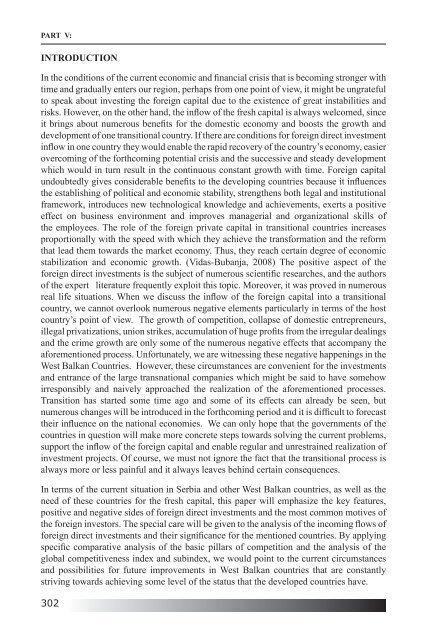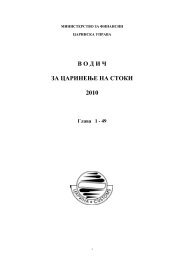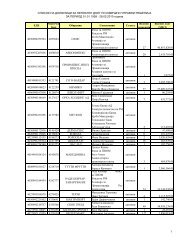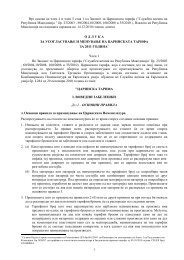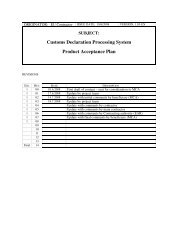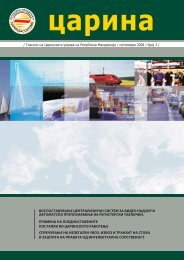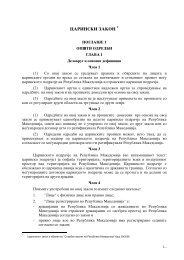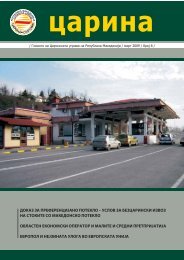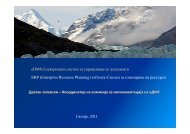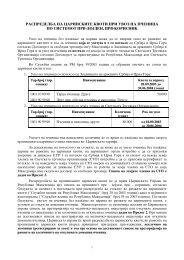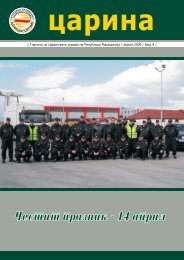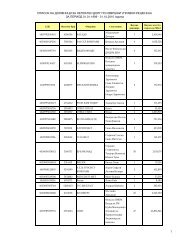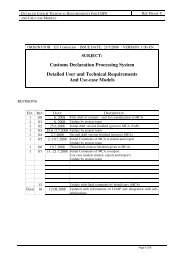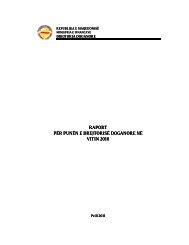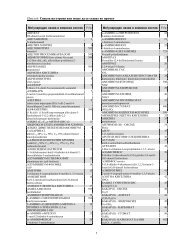REGIONAL COOPERATION AND ECONOMIC INTEGRATION
REGIONAL COOPERATION AND ECONOMIC INTEGRATION
REGIONAL COOPERATION AND ECONOMIC INTEGRATION
- No tags were found...
Create successful ePaper yourself
Turn your PDF publications into a flip-book with our unique Google optimized e-Paper software.
PART V:<br />
INTRODUCTION<br />
In the conditions of the current economic and financial crisis that is becoming stronger with<br />
time and gradually enters our region, perhaps from one point of view, it might be ungrateful<br />
to speak about investing the foreign capital due to the existence of great instabilities and<br />
risks. However, on the other hand, the inflow of the fresh capital is always welcomed, since<br />
it brings about numerous benefits for the domestic economy and boosts the growth and<br />
development of one transitional country. If there are conditions for foreign direct investment<br />
inflow in one country they would enable the rapid recovery of the country’s economy, easier<br />
overcoming of the forthcoming potential crisis and the successive and steady development<br />
which would in turn result in the continuous constant growth with time. Foreign capital<br />
undoubtedly gives considerable benefits to the developing countries because it influences<br />
the establishing of political and economic stability, strengthens both legal and institutional<br />
framework, introduces new technological knowledge and achievements, exerts a positive<br />
effect on business environment and improves managerial and organizational skills of<br />
the employees. The role of the foreign private capital in transitional countries increases<br />
proportionally with the speed with which they achieve the transformation and the reform<br />
that lead them towards the market economy. Thus, they reach certain degree of economic<br />
stabilization and economic growth. (Vidas-Bubanja, 2008) The positive aspect of the<br />
foreign direct investments is the subject of numerous scientific researches, and the authors<br />
of the expert literature frequently exploit this topic. Moreover, it was proved in numerous<br />
real life situations. When we discuss the inflow of the foreign capital into a transitional<br />
country, we cannot overlook numerous negative elements particularly in terms of the host<br />
country’s point of view. The growth of competition, collapse of domestic entrepreneurs,<br />
illegal privatizations, union strikes, accumulation of huge profits from the irregular dealings<br />
and the crime growth are only some of the numerous negative effects that accompany the<br />
aforementioned process. Unfortunately, we are witnessing these negative happenings in the<br />
West Balkan Countries. However, these circumstances are convenient for the investments<br />
and entrance of the large transnational companies which might be said to have somehow<br />
irresponsibly and naively approached the realization of the aforementioned processes.<br />
Transition has started some time ago and some of its effects can already be seen, but<br />
numerous changes will be introduced in the forthcoming period and it is difficult to forecast<br />
their influence on the national economies. We can only hope that the governments of the<br />
countries in question will make more concrete steps towards solving the current problems,<br />
support the inflow of the foreign capital and enable regular and unrestrained realization of<br />
investment projects. Of course, we must not ignore the fact that the transitional process is<br />
always more or less painful and it always leaves behind certain consequences.<br />
In terms of the current situation in Serbia and other West Balkan countries, as well as the<br />
need of these countries for the fresh capital, this paper will emphasize the key features,<br />
positive and negative sides of foreign direct investments and the most common motives of<br />
the foreign investors. The special care will be given to the analysis of the incoming flows of<br />
foreign direct investments and their significance for the mentioned countries. By applying<br />
specific comparative analysis of the basic pillars of competition and the analysis of the<br />
global competitiveness index and subindex, we would point to the current circumstances<br />
and possibilities for future improvements in West Balkan countries that are constantly<br />
striving towards achieving some level of the status that the developed countries have.<br />
302


